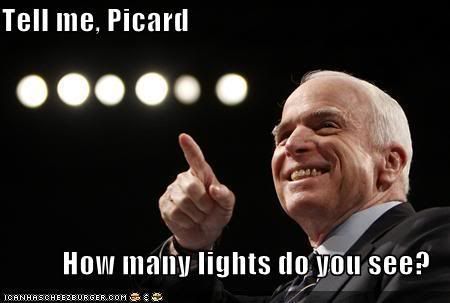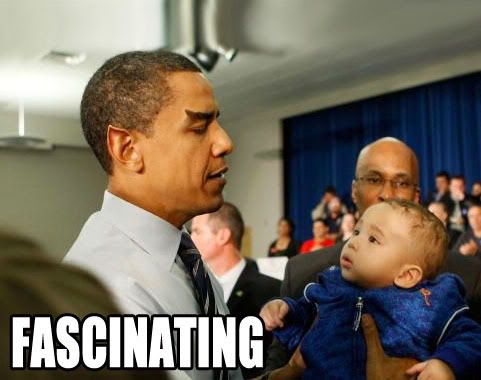
According to gossip sites P6 and Gawker, "Leonard Nimoy was at a recent Barack Obama event when the candidate spotted him in the crowd and acknowledged Mr. Spock with the Vulcan hand signal."
In my opinion, this is great news because the onus is now completely on McCain and Palin to prove they are viable players on the interstellar politics field, and they will probably fall flat on their faces. Here are a few examples illustrating their inability to keep up with their Democratic competitors which I've culled from interview transcripts and recent articles about Palin:
"COURIC: I'm just going to ask you one more time, not to belabor the point. Specific examples of alien leaders who don't think you're a total jag?
PALIN: I'll try to find you some and I'll bring them to you."
-------------------
"PALIN: We have trade missions back and forth. We-- we do-- it's very important when you consider even national security issues with Qo'noS as Gowron rears his head and comes into the outer space of the United States of America, where-- where do they go? It's Alaska. It's just right over the border."
-------------------
"The comments came during Palin's visit to a tube grubs restaurant on Ferenginar on Saturday night, when a voter asked if she supported a cross-border attack on Bajor.
'If that's what we have to do stop the terrorists from coming any further in, absolutely, we should,' Palin responded, in comments that contradict McCain's long-standing position of consulting with the Bajoran provisional government before carrying out attacks on terrorists within its borders."
-------------------
"MCCAIN: Senator Obama twice said in debates he would sit down with the Crystalline Entity, the Xindi Council, and the Founders without precondition. Without precondition. Here is the Crystallinstiltsts [mispronunciation], Crystalline Entity, who is, the Crystalline Entity, which is now in this sector, talking about the extermination of the world of Betazed, of wiping Betazed off the star charts, and we're going to sit down, without precondition, across the table, to legitimize and give a propaganda platform to an entity that is espousing the extermination of the people of Betazed, and therefore then giving it more credence in the galaxy arena and therefore saying, it's probably been doing the right thing, because you will sit down across the table from it and that will legitimize its illegal behavior.
OBAMA: Senator McCain mentioned Admiral Nechayev, who's one of his advisers, who, along with five recent UFP secretaries of state, just said that we should meet with the Crystalline Entity -- guess what -- without precondition. This is one of your own advisers.
Now, understand what this means 'without preconditions.' It doesn't mean that you invite them over for tea one day. What it means is that we don't do what we've been doing, which is to say, 'Until you agree to do exactly what we say, we won't have direct contacts with you.'"









